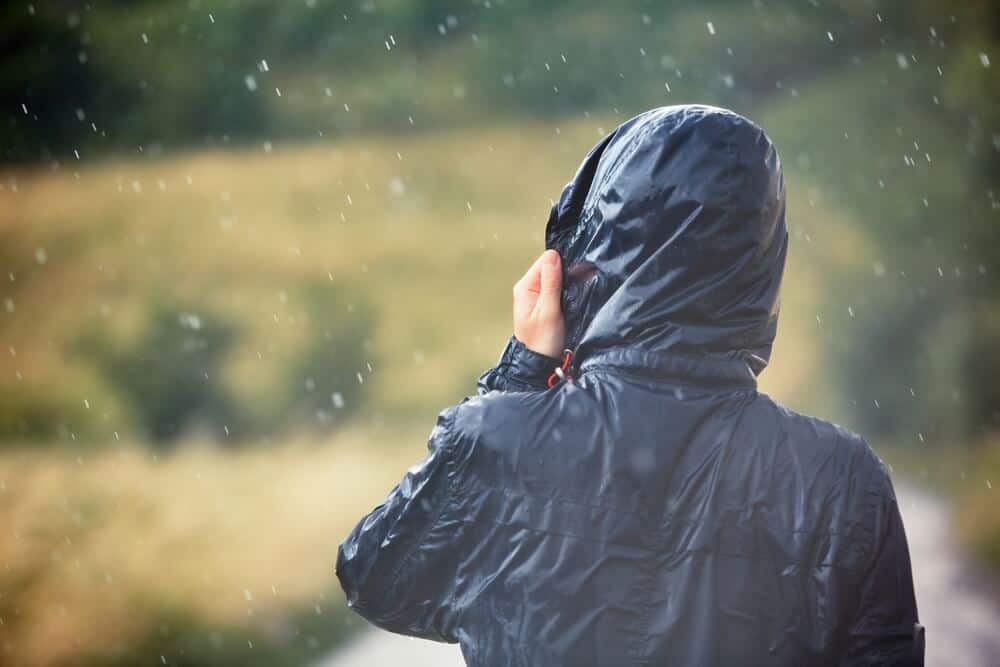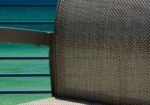Traveling in the great outdoors may provide unexpected challenges. It’s incredibly hot one minute and raining the next. Wearing heavy garments only to remain dry might be exhausting and being soaked with water is also an unpleasant sensation.
So you need a fabric that is lightweight, comfortable and waterproof. And when you begin to wonder what fabric might be ideal, then nylon is something that crosses your mind.
Nylon is a good fabric when it’s raining but it is not 100% waterproof, although it is water-resistant. While nylon is not waterproof by nature, it may be a good core material for many water-resistant items. This is due to the fact that nylon can be made water resistant by either enhancing production procedures or applying an external coat so that it repels water better.

Let us understand some general pros and cons of nylon fabric:
Pros
-
-
- Because it is a lightweight fabric, it is ideal for intense physical activity.
- It is sturdy and durable in nature
- Scratch and cut resistant.
- Simple to clean and resists wrinkles and shrinking.
- Dries rapidly and holds folds really nicely.
- Resistant to grease and the harm that it might inflict.
-
Cons
-
-
- Prone to pilling.
- Generates static energy.
- Not resistant to the sun’s UV radiation.
- Does not absorb a huge amount of moisture.
- Does not fare well in hot weather.
-
Since we know that nylon can be used in rain, what features should you look for in a fabric to make it ideal for rain?
1.) Quality- Quality is a really important aspect to look for any apparel if you want to use it during rain. You’ll need something breathable that regulates body temperature and manages moisture well. Water resistant fabrics provide adequate protection against heavy rain.
However, nylon is anything but breathable, therefore you can look for nylon blended with cotton or any other breathable fabric to get the best of both worlds.
2.) Fabric choice- What material is ideal on rainy days? Nylon and polyester are perhaps the first materials that come to mind. Poly spandex and nylon spandex are both ideal alternatives since they provide improved moisture control.
3.) Avoid cotton- Cotton is very absorbent, which causes it to become heavier when wet. When cotton becomes damp on your skin, it becomes uncomfortable to wear.
Wearing wet cotton cloth is a vexing experience since it does not dry quickly and will keep you wet long after the rain stops.
What makes nylon ideal for rain?
1.) Nylon is extremely versatile and is used in a wide range of sectors. To begin with, it is a very strong and robust fabric, which makes it more resistant to wear which means that it will last a long time.
It is also a flexible material that aids in the fabric returning to its original form without sacrificing the appearance and feel of the garment.
2.) Because it is a lightweight fabric, the final fabric will be lightweight as well, making it suitable for usage in a variety of clothing with multiple uses.
Also, abrasion resistance is vital in fabrics designed to be durable, especially those meant for outdoor use, and nylon is very abrasion-resistant.
3.) Furthermore, nylon is very resistant to heat and temperature, with a melting point of roughly 500°F, which is a temperature that is unlikely to be encountered in our daily lives.
In terms of weather resistance, nylon is not extremely insulating, thus it is best suited for clothing that is more suited to dry weather.
4.) It is also extremely water-resistant, with very minimal adsorption. This is useful when trying to design clothing that will not get wet even if they come into touch with rain.
5.) Nylon is also resistant to mold and mildew because of its moisture resistance and synthetic content. Finally, nylon is very resistant to most chemicals and substances that we encounter in our daily lives.
Why is nylon used in apparels?
The properties listed above provides a decent sense as to why nylon is so popular in apparels. The fact that nylon is flexible enough while still being quite resilient to wear and resistant to abrasions implies that clothes made of nylon do not mind being in contact with the outdoors, especially during rain. This extends the life of your jacket and the quality is not compromised.
Also, being able to withstand water is an important attribute in clothes during the rainy season. Nylon is also less insulating than polyester, it is more suited to use in warmer conditions when you require adequate coverage but do not want to wear a stuffy outer layer.
See also: Best Waterproof Work Jacket for Men and Women
Nylon in backpacks, tens, sleeping bags and other outdoor gears.
You may have a better understanding of how nylon performs in other outdoor clothing now that you know more about its properties and how it is utilised in apparels.
In terms of backpacks, nylon’s toughness and low water absorption makes it an excellent choice for long-lasting and weather-resistant backpacks.

Because nylon is not prone to oil-based stains, this is another feature that makes it a desirable fabric for backpacks as it helps them tolerate stains better, resulting in less washing. This is helpful in outdoor conditions.
Also, sleeping bags and tents are similar to backpacks, and they generally come with a covering that helps them survive not just the weather but also last longer.
Nylon does not tear easily and does not rip through when ripped. Rather, it helps to limit the tear where it occurs, resulting in a higher performing and longer lasting sleeping bag or tent.
Things to keep in mind while using nylon during the rainy season.
Nylon, like other synthetic fabrics, has an environmental impact. In terms of outdoor wear and performance, while nylon is resistant to moisture, which makes it resistant to mold and mildew, it does not do well in heat, sunlight. This is particularly noticeable in white nylon fabric, which develops a yellowish tone with time.
The most serious concern is that it will melt if it catches fire. As a result, it is also advised to avoid using high heat and ironing the cloth. Furthermore, as a fabric, nylon is naturally wrinkle-resistant, eliminating the need for ironing.
FAQs-
1.) Can you wear nylon in the summer?
Since nylon is not a breathable fabric, it is not advisable to wear it during summers as it tends to trap heat, sweat and odor. You might feel uncomfortable wearing nylon during summers.
2.) Does nylon provide warmth?
When you rely on nylon to keep you warm, you are not sufficiently protected from the cold since it is a poor insulator. It does not keep a lot of heat, therefore it is advisable to look at different fabrics for that reason.
3.) Main products made from nylon.
Nylon is a highly versatile fabric that is utilised for more than just coats, outdoor gear, and clothes.
Because it is a thermoplastic, a wide range of plastic items are created of nylon, including machine components, bolts, screws, and parts used in spinning mechanisms or other appliances owing to its great abrasion resistance.
See also: Do Bomber Jackets Protect Rain?
Conclusion
As you can see, nylon has various benefits to provide, with a very adaptable nature that finds application not only in the clothing business, but in all industries that employ plastic.
Its properties as a fabric make it suitable for light clothes, coats, and outdoor gear such as tents or umbrellas. Therefore, it is no surprise that it is one of the most ideal fabrics used during rain.







